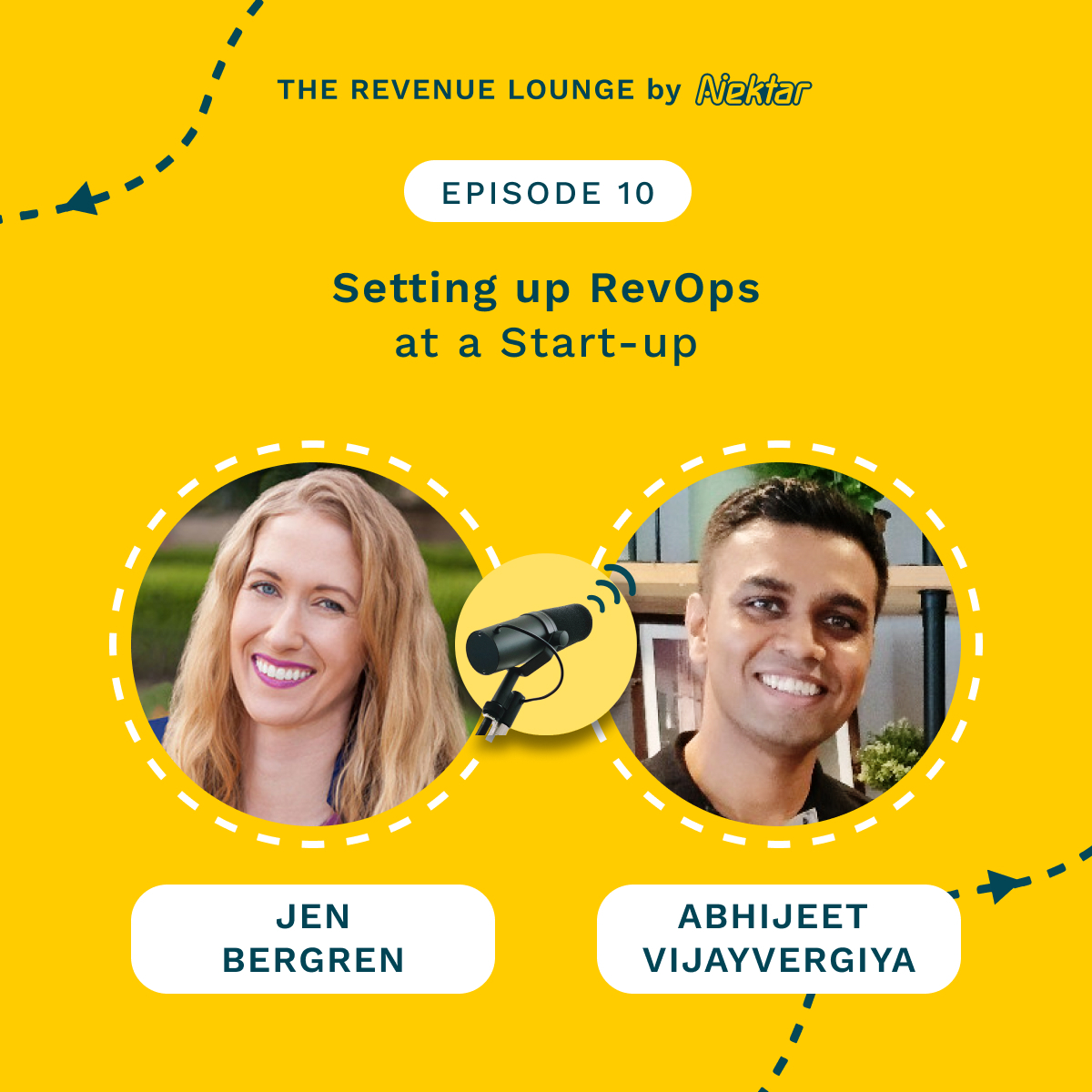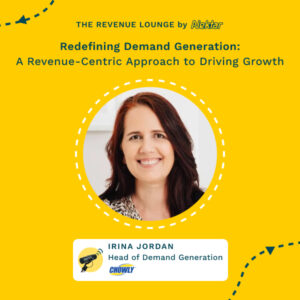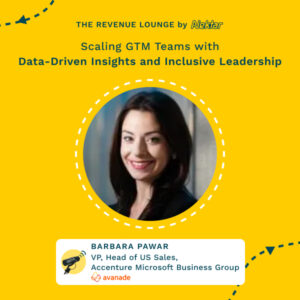Ep #12: Driving Revenue With Clean CRM Data ft. Jacki Leahy
June 21, 2023
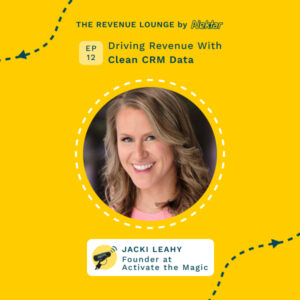
About
The Revenue Lounge
The podcast covers stories from leaders across RevOps, Sales, Customer Success, GTM, Data and Marketing about what drives these functions and what advice they would share with our listeners. With 3 seasons recorded, the podcast currently features 50+ enterprise leaders in the B2B SaaS domain. Tune in to hear from the best in the business
CRM is a steep investment for companies. But getting ROI from CRM remains a challenge for revenue leaders.
We all know that CRM data needs to be better. But how can we make it better in a way that helps sales win more deals? Let’s ask our guest today!
We have Jacki Leahy, who is a Fractional RevOps Leader and Founder at Activate the Magic. Jacki has had an interesting career path, from being a kindergarten teacher, a Manhattan apartment broker to a RevOps leader today.
Let’s hear it from Jacki!
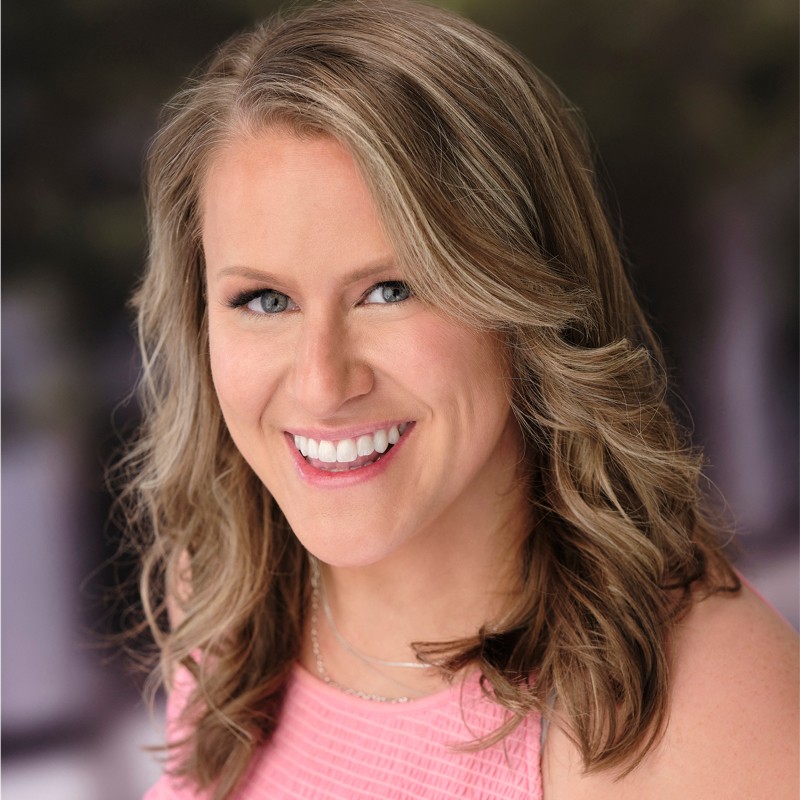
[00:00:00] Hello everyone. Welcome to the Revenue Lounge podcast. My name is Bhaswati, and today we are going to talk about CRM data quality, how to achieve clean CRM data, and how it can ultimately help in driving revenue in a sustainable manner. We all know that CRM data needs to get better, but how can we make it better in a way that helps sales win more deals?
[00:00:22] Let’s ask our guest. Today we have Jacki Leahy, who is a fractional RevOps leader and founder at Activate The Magic. Jackie has had an interesting career path from being a kindergarten teacher, a Manhattan apartment broker, to today where she is a Rev ops leader. Welcome to the Revenue Lounge Podcast, Jacki, and thank you so much for joining us today.
[00:00:42] Absolutely wouldn’t miss it for the world. You call yourself an over-caffeinated Salesforce magician, and I just wanted to tell you that I’m intrigued by every word in that sentence. Well, thank you. It takes a lot of coffee and I’ve got a cauldron and lots of herbs, [00:01:00] candles. Love that. We can dive into that a little later, but first of all, Congratulations on starting your journey as an entrepreneur with Activate the Magic.
[00:01:10] You can start by telling us a little bit about how it’s been going for you at Activate The Magic and do you endorse entrepreneurship yet?
I do. I had resisted it for so long, like I helped my parents run a business and just the idea of payroll and managing and all the things. I was like, please, no, never in a million years, but actually it’s been, I.
[00:01:35] So much fun. Luckily, I’ve been so aggressively helpful in the community for like a decade, so just one LinkedIn post and referrals came rolling in and it’s just so fun and beautiful to be able to help companies. Get unstuck by CRM and operations and systems. And so I started in [00:02:00] August, 10 days after I launched, I secured my first client who found me via Instagram, which I’m not even on.
[00:02:08] Someone had centered to me. So we’ve had a couple clients churn just because they hired someone internally, but now we’ve got five clients I’ve taking on a business. Partner and just to make it more scalable and more robust and. To add more ease to the day. So I get to focus on all the stuff that I absolutely love and then when the deep architectural data mayhem happens, there’s Heather who absolutely loves that.
[00:02:39] So it’s a good partnership. That’s great. Seems like things are looking up for Activate the Magic and we are really happy to know that. So like the introduction mentioned, you’ve had like a myriad of. Career experiences. It’s really fascinating to know how all of that led to Rev ops. So if you could just tell us how you got into rev ops and what’s your story?
[00:02:58] Yeah, so [00:03:00] in 2015, I pivoted to tech and even though I had sold millions of dollars in real estate and had a long career in sales, it wasn’t. Software sales. So I got to start at the bottom as a BDR at the tender age of 33, and I think the deep frustration of this doesn’t make sense. Nothing works like leadership has actually no idea of what’s going on in just the frustration just runs downhill and like nobody actually knew what was happening and nothing worked.
[00:03:35] I think that really fuelled my passion. I. For things making sense and things working, because at the end of the day, if my job doesn’t make sense, I don’t feel valued. And like people matter and people get to matter at work. And that happens when things make sense and when the board can easily access data that makes sense.
[00:03:56] And it’s aligned across departments and it. [00:04:00] Tracks from the bottom to the top. Yeah. So that’s just, I’m on a mission and when things make sense, people matter and it doesn’t let the bullies bully. So that’s my mission. Love that. And so that’s such a big pain point that’s so many of us feel, and we are glad that.
[00:04:19] Revenue leaders like you are passionately working towards solving some of those data problems. So the next question is something that we ask all our guests. Maybe you could tell us how you look at revenue operations, like how you would define this particular function. Yeah, so I definitely look at it as part of operations.
[00:04:37] So I see it ultimately as a segment of operations would be business operations, and then a segment of business operations would be revenue operations. And it’s the strategy. It’s the people, it’s the process and it’s the tech stack all coming together to support sustainable growth and factored and refactored along the buyer’s journey.
[00:04:59] Yeah. Getting [00:05:00] back to the phrase that you used that I absolutely love is you call yourself an over-caffeinated Salesforce magician, and you are the CRM expert and you know Salesforce in and out, and you’ve helped many companies, as you mentioned, work their way around this. Mammoth tool. So today we will talk about what drives a CRM, which is the data in it.
[00:05:21] So my first question to you is, what are the biggest challenges when it comes to CRM data today for Revops to be able to function optimally? If you have to name, let’s say, your biggest CRM data nightmare, what would that be? Yeah, I think it’s boiling the ocean, like sales leaders who. Want every single data point from all the data sources, so it’s caring about too many things, which sounds weird, but really focus on a handful of data points.
[00:05:53] That we’re going to be just immaculate and maniacal about. And for each of those data points [00:06:00] have an objective source of truth. Anything that relies on a human to input, especially end user, like their job relies on it. You just can’t rely on that. And it’s not even that you need to have one source of truth for the whole system.
[00:06:14] Like ZoomInfo is fantastic, but sometimes with firmographics you’re gonna want a different. Source of truth, like I love Data Fox for that. So for each of your data points that we’re gonna be maniacal about, we’re going to absolutely choose an objective source of truth that owns that. And even if we disagree with it, At the end of the day, that’s what we get to go buy.
[00:06:39] So there’s fairness, insanity, and when too many cooks in the kitchen of wanting sales reps to fill out all the things in order to pass it on to customer success, and it’s like, okay, well, who’s gonna tell sales that they now have to. Enter more data, and if that data doesn’t actually matter to them, [00:07:00] why on earth are they not going to just put in some dummy text like, and it’s not about morality, it’s about making sense and things working.
[00:07:09] Like seriously, let’s walk the line. What are the inputs? What do people care about? And whoever cares the most should be in charge of that. Yeah, yeah. Makes sense. Just focus on the right things. Can you cite some examples from your experience on how bad data, like inaccurate scale data, missing data, incomplete CRM data, how has all of impacted a company’s sales and revenue goals?
[00:07:35] If you could just cite an experience. For us. Yeah. The classic example that I see again and again is just like a graveyard of open opportunities with closed dates like far in the past, and you really need like a culture of excellence and inspection around. Especially opportunities in a sales org, because if you’ve got all these opportunities and you’re not really being rigorous about it, you [00:08:00] can get stuck thinking you’ve got a pipeline that you really do not have.
[00:08:04] And the same thing goes for measuring the wrong things. Like I was at an organization that would ding reps for their win rate, which down the line meant that they were not accepting opportunities, right? So they would have an inflated win rate. But then BDRs weren’t getting any of their opportunities into the hands of the reps, or even just reps needing to sort of pad their pipeline just for the sake of, how’s your pipeline looking?
[00:08:36] And all of those things just add to just, this doesn’t make any sense. Why are we doing this? Yeah. I think that that’s the thing that enrages me. Great point. So CRM data, it just. Gets outdated at a ridiculously fast rate. Right? So maintaining this data hygiene is extremely crucial to get the best out of it.
[00:08:54] What are some of the best practices, according to you, for maintaining this hygiene to make sure that the data we [00:09:00] are going after or the insights are accurate with? Yeah. Well first things first, you don’t need to hoard data. Like, like a lot of operators get really screamy when I’m like, let’s. Download and archive this whole chunk of irrelevant, outdated data.
[00:09:20] And it’s like, but, but, but it’s like, but what I know, I don’t even work there anymore. And really just being super clear about. What is, I think nine times outta 10, we’re dealing with a account-based sales motion. What accounts do we actually care about? Let’s get really rigorous about our account scoring and if it’s outside our purview archive that do not care about that.
[00:09:48] Get some. Firmographic or behavioral reliable data that keeps that fresh. I like to refactor every quarter. Yeah. And if it really, it falls below that line, get it out. [00:10:00] And that way the accounts that you act, that you do have remaining you care about and. It’s a no, duh. It’s an of course when you wanna pay for that enrichment.
[00:10:11] Like either your reps are gonna do it by hand or someone’s gonna do it by hand, or you’re just, you pay the mafia for the enrichment. Yeah. That’s what you gotta do. Yeah. Less is more when it comes to data. Yeah, absolutely. And of course, it’s gonna vary based on your sales motion and what’s working for you, like if you’re getting inbound leads.
[00:10:34] It’s probably way more important to have Clearbit enriching as they come in versus a ZoomInfo if you’re doing more outbound. Yeah. Got it. Yeah. So we’ve had guests on this podcast before who’ve shared their lessons on maintaining data governance strategies. So what’s your take on the importance of data governance here?
[00:10:54] I know you mentioned like a cleanup every quarter. Apart from that, if you would be kind enough to share [00:11:00] some details on what an ideal C R M data governance strategy should look like. Well make sure not everyone is a system administrator. You’d be surprised, like, oh my gosh, oh my gosh. Either embrace the profiles versus permission sets versus sharing rules like or tag a friend who just loves it and you just kind of gotta sit down and understand what each role.
[00:11:32] Really needs access to and what they should be able to read, what they should be able to overwrite and just real like there’s really no shortcut. Yes, making everyone system and administrator and crossing your fingers is not the shortcut that everyone thinks it is. Yeah, too many cook spoil. The broth applies here as well.
[00:11:51] Moving on to the next question. With the current market conditions, customer retention has. Actually become a key goal for business leaders, right? Getting more [00:12:00] renewals, reducing churn. These are things that are obviously always important, but in lean times, like right now, doubling down on showing the existing customers, love has emerged as a top priority for revenue generation.
[00:12:12] So, How does C R M data completeness and data quality, what’s the role that plays here when it comes to actually helping to build this customer retention and loyalty? Yeah, I think now more than ever, well, a finally thank you. Sustainable growth and the value of customer retention and growth is so overlooked.
[00:12:35] So it’s like a finally, hallelujah. Let’s have a ticker tape parade and. For this bit, especially when it comes to SaaS, getting your product data, maybe not all of it, and populated into Salesforce or wherever your customer success people are working out of to really segment and. [00:13:00] No. Hey, who are the people who are kicking butt?
[00:13:04] Maybe even like innovating with how they use your product, and just go full force in that sort of discovery and evangelism and get objective and curious about the people who aren’t really using your product, like given their role, given the company that they’re at. It’s just off where you’re seeing.
[00:13:28] Happy customers be and that doesn’t look like, Hey, customer, what would you like us to do? Because they don’t know. Right? So maybe some experimenting with a UI or some experiments or some researching sort of thing, the behavior, but. I’m pretty obsessed with tech and when tech companies interview me, they’re [00:14:00] like, what should my product do?
[00:14:01] I’ll tell ’em eight things that I think, but that doesn’t mean that that’s where they should be going. Yeah, so I think Hot take customer. Interviews, customers don’t know what they want. Yeah. Yeah. We talk about how it’s getting very difficult for sellers and business leaders to drive more revenue, but at the same time, it’s also getting extremely confusing for the buyer as well.
[00:14:24] Right. There is just so much thrown at them all the time, and even buying can be like a very intimidating process. So yeah, I think helping them out at every stage and knowing exactly the kind of. Assistance they might be looking for is a great piece of advice that you just shared. Yeah. Yeah. And it feels really awkward when I get on like, oh, product wants to talk to you.
[00:14:46] Okay. I get on. They’re like, what do you want? I’m like, I dunno. And now I for not knowing and I’m pretty self-aware.
[00:14:59] [00:15:00] Yeah, that’s a good one. Moving on, you said you are passionate about technology and if we. Are talking about rev ops, we have to talk about the tech stack, and CRM is of course one of the steepest investments in the tech stack. But der roi, again, it’s like a big nightmare, right? We have bad data driving poor insights all the time, but there’s also the second part about adoption users not using the tool the way it was intended for.
[00:15:27] Right? So what role do you think clean and complete CRM data can play in. Driving higher ROI, like getting people to adopt to the tool and use it in a way that it actually helps them in their day-to-day operations. Yeah, I think this is where really shadowing your end users, like in operations, it’s called Walking the line, like start at the beginning.
[00:15:52] And really it’s not just like, oh, I know what you do, but it’s like, oh, I’ve sat next to you as you [00:16:00] had to have five different tabs open. Just to find out X, Y, Z, and it changes from understanding to like actual compassion. Like, oh, like really getting what would make their day way better. And not necessarily solving for that yet, but once you do that, knowing what would make a difference and then all of a sudden getting creative about how we could get that info for them, like.
[00:16:32] Maybe we do have some insights on how an account is being used. We just have the data siloed somewhere else. Now, what would be the lift to bring that over and where else could that help? There’s a lot of data hanging out in product, or even like the marketing edge in that if we were able to properly harness that, especially with tools, kind of the newer.
[00:16:58] Tools that are [00:17:00] coming up like Sinky and get Cargo and Y 42. These tools are letting us harness data, normalize it, and then keep it up to date across the entire revenue engine. And there’s just so much more of that we can do in a programmatic way to make people’s days more delightful. Yeah, yeah. So showing them the value that they can actually derive from the tools rather than just.
[00:17:27] Forcing it down their throat to use. Yeah. Yeah. I do think one of my. Advantages is because I was an end user for so long that I look at things like, no, I just wanna check a box, have the date stamp somewhere else on the background. I just wanna check a box. I don’t wanna fill out a date. So really having empathy for that end user and compassion for what their day is like.
[00:17:52] Yeah, because you’ve been in those shoes, you empathize and you understand the pain very well. And yeah, we are with the reps there till the [00:18:00] time they don’t see value in the tool. They are not going to use it as simple as that. So yeah. Thank you for sharing that. That brings us to the end of the first section of the questions.
[00:18:10] And now moving on to my favorite part. This is the rapid fire round where we ask our guests a series of questions with the intention of. Obviously getting to know you better. Are you ready for the rapid fire? My body is ready. I’m actually going to add one question to the rapid fire that I have been meaning to ask you.
[00:18:30] Oh. This is one bonus question that I’ll start with. Where do you get your inspiration for those kick ass memes that you put out? So I have a background in comedy. I studied improv comedy quite aggressively in New York City. Yeah. For about five years. And. Then during Covid? During Covid and a little bit before I actually, no, this was way before Covid.
[00:18:54] I ran a Tumblr account. That ended up being kind of a big deal in the One Direction fandom, [00:19:00] and that’s where I really honed my craft of memeing. Yeah, no. So I just think making people laugh in in that comedy is absolutely a key driver for me. Yeah, it’s my art. There is. So yeah. Moving on to the official first, the rapid fire question.
[00:19:23] What is one book that you have loved in the recent past that you would recommend? Let’s see. I’ve been reading The Untethered Heart, and it’s a beautiful way to look at who we are and what we’re here for. Just knowing that you know who we are isn’t our mind. And who we are isn’t the weird beliefs that our ego has put together and held onto like at our soul or love and like getting back to who we really are and yeah.
[00:19:56] Expressing that. Wow. So it’s usually, you know, we get a lot [00:20:00] of business book recommendation, so I always love it when I get a non-business one, oh, it’s Untethered Soul. It’s along the lines of Eckhart Tole. Uh, yeah. Human potential. Sounds like something we should all get our hands on. I’m definitely gonna pick that up.
[00:20:17] So what’s your favorite part about working in operations? I get to build fun things in sprinkle joy. Yeah. Yeah. And I get to stick my little fingers in my nose and I get to be super nosy and curious and get all in everybody’s business and no, 140% way too much about anything. So it scratches that like curiosity, nosy bug.
[00:20:43] And it’s a bit like, you know, playing with Legos and Yeah. And also the human dynamics are, Super fun, especially as a consultant being a little bit outside, a little bit removed and being able to see the system work. It’s endlessly fascinating. Yeah. Yeah, that’s a good [00:21:00] one. This reminds me of our conversation with Rosalyn when she said that.
[00:21:04] If we are in revenue operations, we are touching every part of the business, for sure. Oh yeah, yeah. Talking about favorite parts, we also have to go to the controversial side of it a little bit. What’s your least favorite part about working in operations? Well, no one really high, high fives you when things are working as expected.
[00:21:22] You only really hear from people when things are broken. Are you saying it’s like a thankless job? Most of the time it can be unless you go tell people what you did. And wait for the compliment.
[00:21:36] It’s, it’s called being proactive. Yeah. Got it. Got it. You’re listening. Just go and pat your ops person on the back today. Just do it right. Oh, they’re doing a great job. You heard Jackie? Yeah. Uh, so next, who is one Rev ops leader you personally look up to and why? I absolutely love Erol Toker. He is just a mad scientist and looks at.
[00:22:04] Problems completely differently, and he makes me so mad sometimes. And then once I kind of let it wash over me, I’m like, huh, he’s got a point here. So he keeps me mad and that’s always good. No, absolutely. I think we should also get him on the show, but totally with you on that. My next question is, what’s an advice that you’ve received from someone in any phase of your life that has.
[00:22:30] Stayed with you when that you’d like to share? Well, the piece of advice I absolutely love, like Tony Robbins and something he said that I heard recently was sell them what they want and give them what they need. And I think especially in ops, A lot of times we know exactly what they actually need, but people tend to come to me with symptoms, right?
[00:22:51] My reps aren’t logging anything in Salesforce. And so it’s like, yes, I hear you. And it’s so tempting to be like, yeah, cuz your UI [00:23:00] sucks. Like. It’s so easy to just rush to the solution and what they need, but they’re not ready for that yet. That’s profound. So last one for you. What is one piece of career advice you would give to people who would like to have your job someday?
[00:23:15] Nothing’s wasted. I’ve had. So many different jobs and careers and truly nothing’s wasted. Like the skills that we learn along the way can be applied and usually can be super innovative to what you’re up to. And nothing beats, nothing will be out a burning desire. Like if you are absolutely clear on what you want and who you wanna be and wake up with that compelling vision and really, Nurture that vision, that burning desire.
[00:23:47] So it’s big enough to burn up. Those because obstacles are coming baby, and just being really clear and really excited about your vision. I think by one, one urging to anyone [00:24:00] in ops or wanting to enter ops, you don’t have to do this alone. It can be a really lonely role. There’s dozens of us, so join Wizard of Ops, get connected with Plugin where all of the rev ops people that you see around were all.
[00:24:18] Absolute nerds who love to help. So just get plugged in, join us. Love that piece of advice. All right, those were all the questions we had for the session. Jacki, thank you so much for being such a wonderful guest. Thank you for sharing those amazing insights with us today. I hope you had fun. Yes, a hundred percent.
[00:24:38] I hope you have a great day ahead of you. You too. Thank you so much Bhaswati. Bye.

Ep #1: Navigating the Downturn with a Hyperfocus on Productivity
Listen Now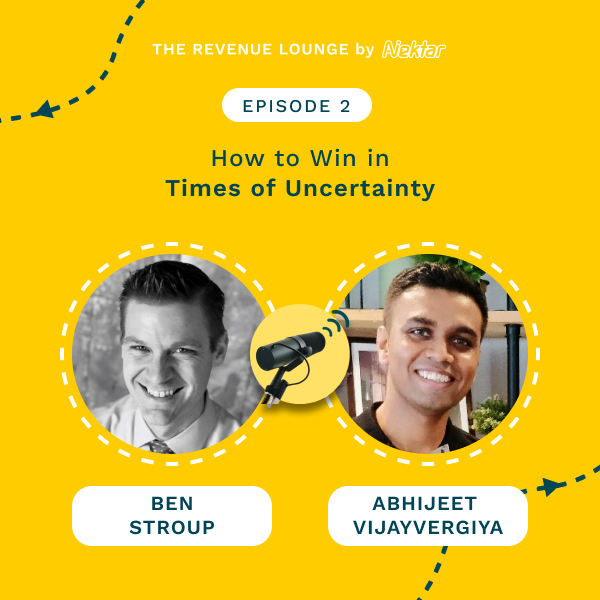
Ep #2: How to Win in Times of Uncertainty
Listen Now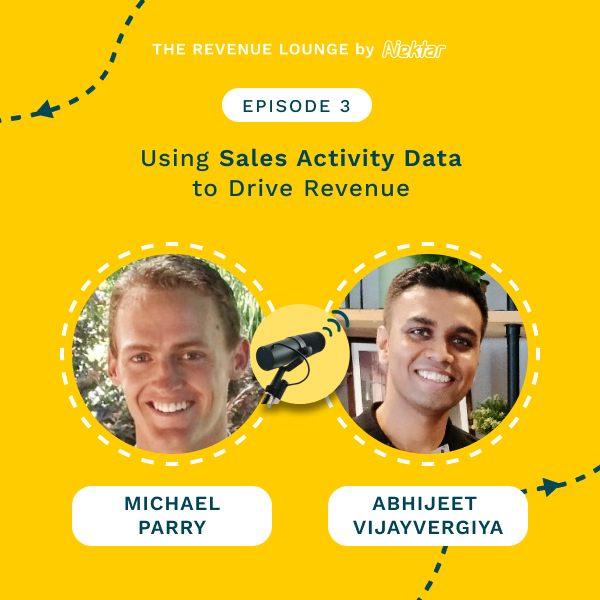
Ep #3: Using Activity Data to Drive Sales Productivity
Listen Now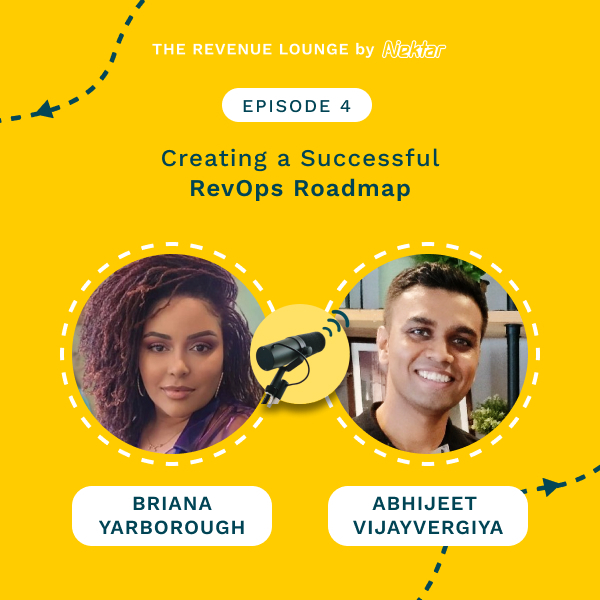
Ep #4: Creating a Successful RevOps Roadmap
Listen Now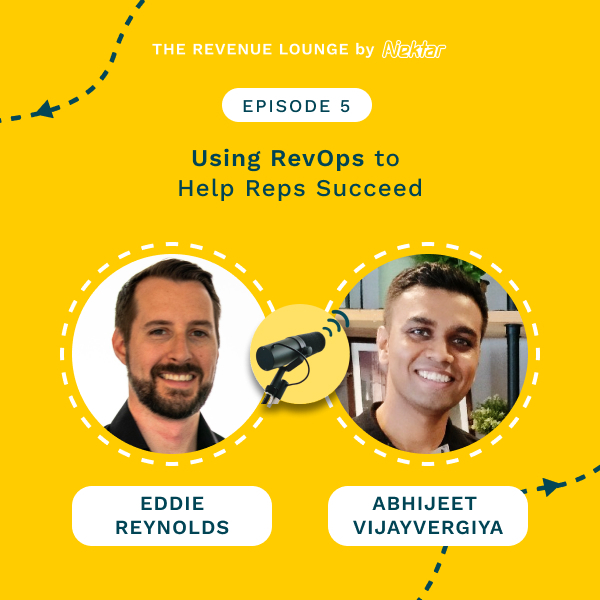
Ep #5: Using RevOps to Help Reps Succeed
Listen Now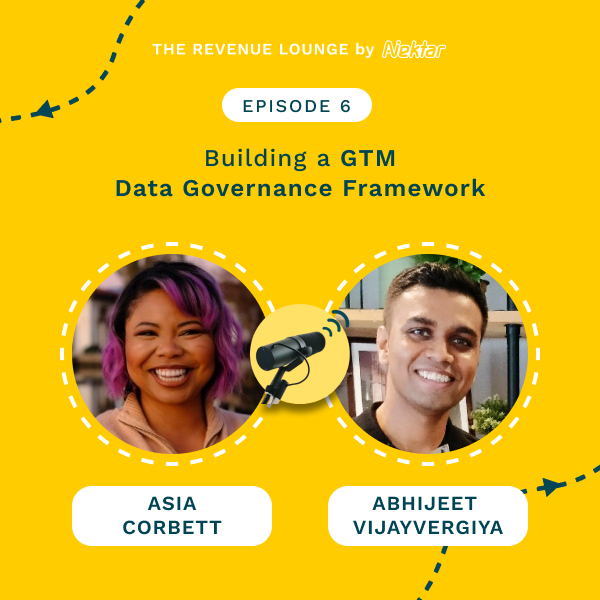
Ep #6: Building a GTM Data Governance Framework
Listen Now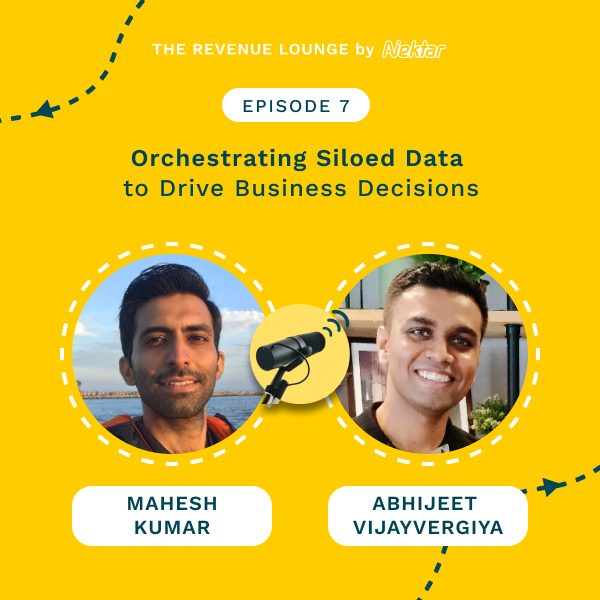
Ep #7: Orchestrating Siloed Data to Drive Business Decisions
Listen Now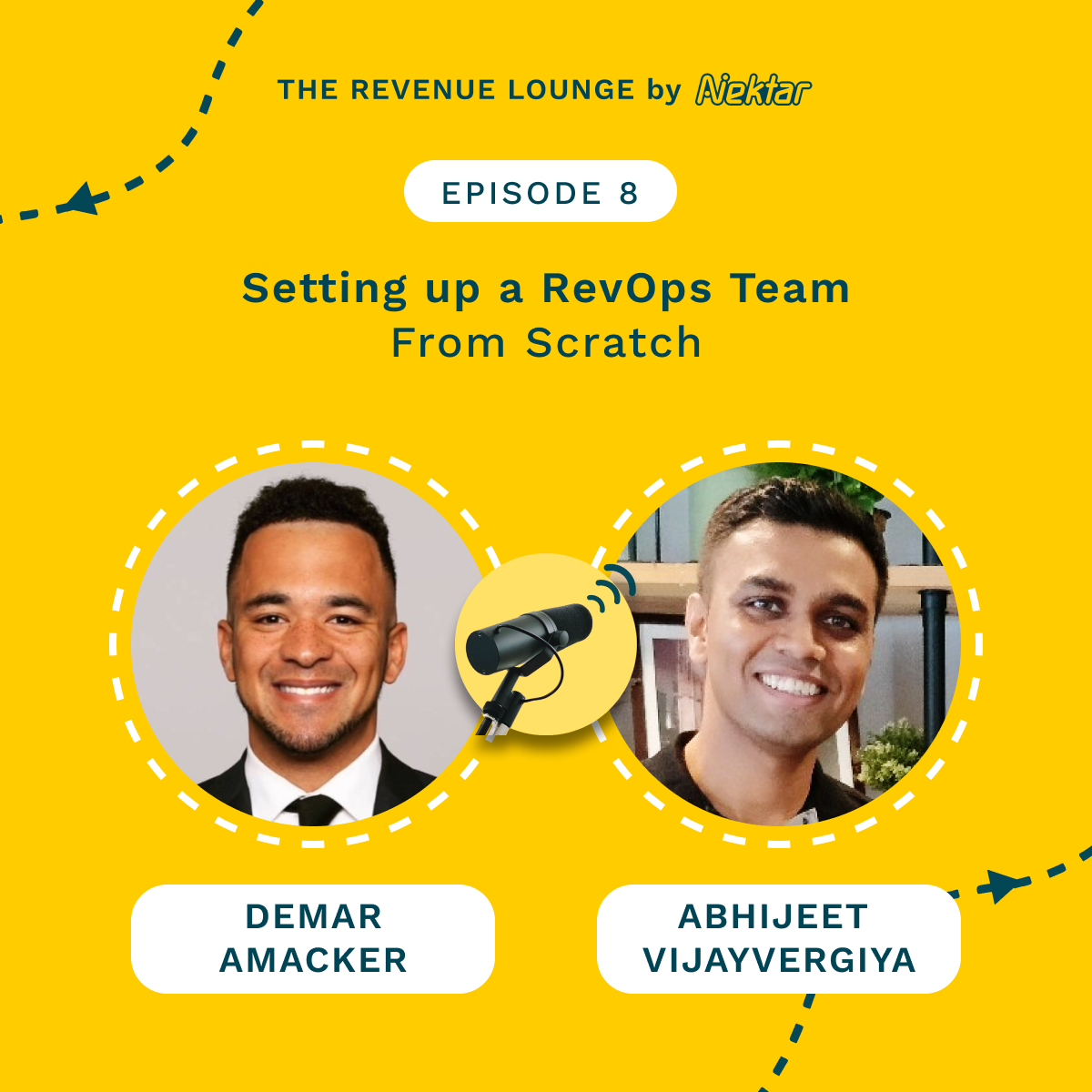
Ep #8: Setting Up a RevOps Team From Scratch
Listen Now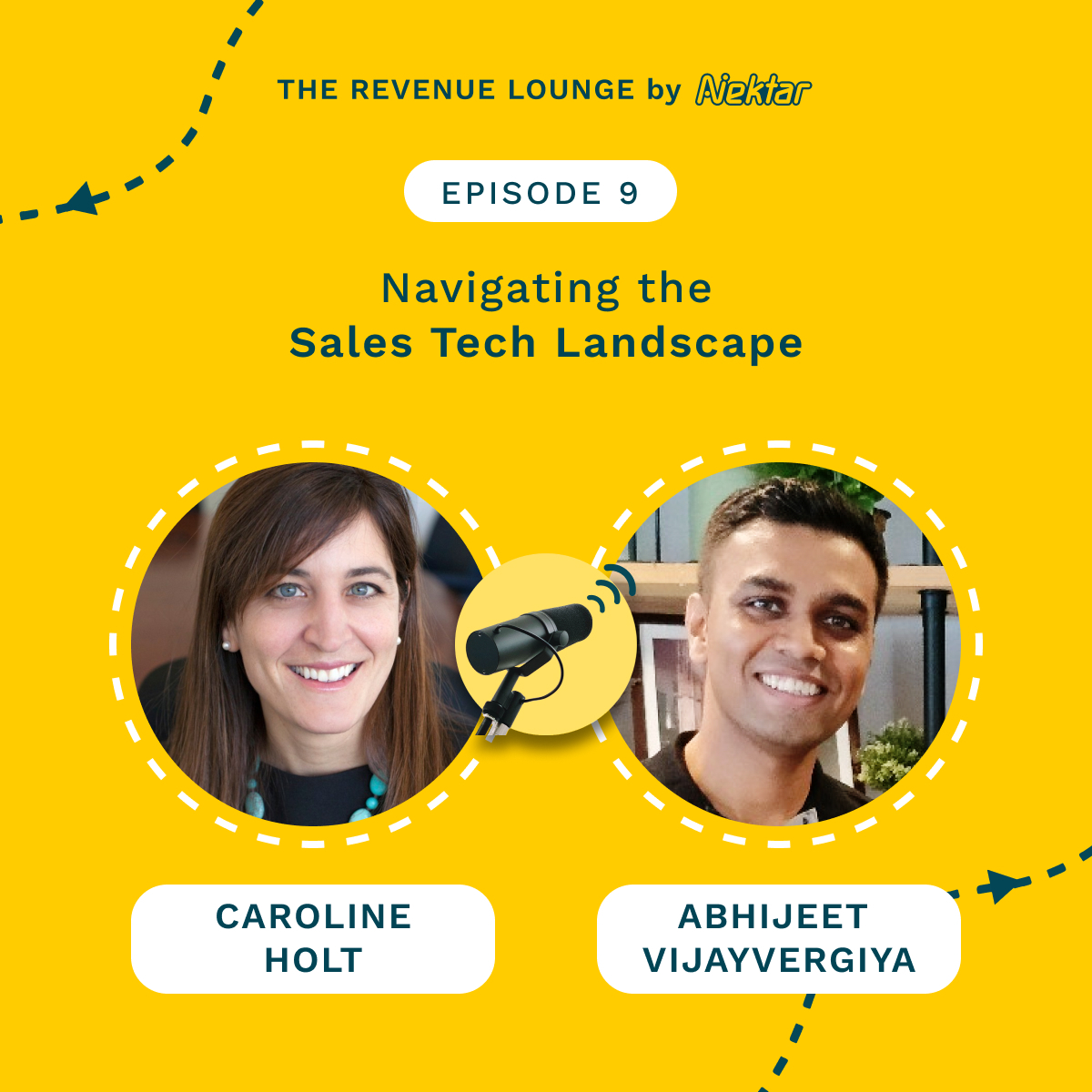
Ep #9: Navigating the Sales Tech Landscape
Listen Now